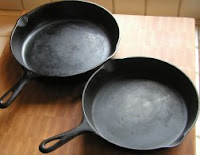 Is it just me? Am I the only one who wants to crow about my cast iron pans? Years ago, I decided to experiment with cast iron skilletry and bought a small, 8-inch pan. It took me a long time to finally season it, mostly because I kept washing the darn thing with soap and water.
Is it just me? Am I the only one who wants to crow about my cast iron pans? Years ago, I decided to experiment with cast iron skilletry and bought a small, 8-inch pan. It took me a long time to finally season it, mostly because I kept washing the darn thing with soap and water.Recently it's finally clicked and I have pretty much stopped using my non-stick pans. Those things have always scared me, and they invariably get scratched and have to be thrown away. Why? Because the coating that makes them non-stick is highly toxic. Why would you want to cook with something that could kill you? Teflon? Kill you. Cast iron? Won't kill you.
The cast iron skillet is one of the wonders of the world, in my opinion. Here's a nifty page from the website What's Cooking America that talks about how to cook with and take care of your cast iron pans, as well as how to save cast iron pans that have fallen into rust and disrepair. It's says everything way better than I could.
Took the photo of cast iron pans from What's Cooking America
3 comments:
We have two cast iron skillets and one Dutch oven. They’re awesome. We’ll never have Teflon in our home due to the birds, whose respiratory systems are highly vulnerable (the canary in the coal mine, and all that). Boo to toxic fumes.
I never even considered that the fumes from non-stick pans would be toxic! Geez, yet another thing to worry about...!
The fumes are an issue only if the Teflon is overheated, but I really prefer avoid taking any chances. If the non-stick surface is in good condition, there shouldn't be any problems until the temperature reaches about 536°F. That'd be rather rare on a stovetop burner, but it can happen if the pan is allowed to boil dry on the high setting. A coating that’s scratched or damaged is more problematic, since it can breakdown at lower temperatures. Birds are more endangered by this than people or other household pets. Birds have fast respiration rates and low body weights, which amplify the hazards. The condition is called Teflon toxicity, or PTFE toxicosis, if you're curious enough to look it up. Death results from hemorrhaging and congestion in the lungs.
Post a Comment